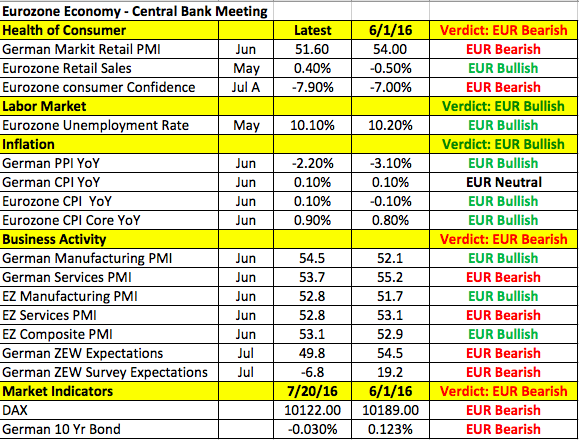By Kathy Lien, Managing Director of FX Strategy for BK Asset Management.
For the past 24 hours, EUR/USD has been flirting with 1.10. The currency pair traded above and below this key level but so far there hasn’t been a meaningful break. Traders are clearly waiting for Thursday’s European Central Bank meeting and are divided on how aggressive the ECB will be. The sell-off in the euro ahead of the monetary policy meeting tells us that some traders are hoping for immediate action in the form of support for Italian banks or an extension of the end date for bond purchases. Yet we feel that the chance of a short squeeze in EUR/USD post ECB is stronger than a steep sell-off. First, speculators are very short euros according to the CFTC’s latest report, which explains why the move to 1.10 has been slow. Secondly, the ECB just eased in March and began their Targeted LTRO program on June 22. Throughout this period, they have said they need more time to assess the full impact of stimulus and we expect this view to remain true in July. Had financial conditions tightened post Brexit, the ECB would feel greater urgency to act but the German DAX is close to recovering all of its Brexit losses as the VIX, which measures stock volatility, dropped to its lowest level since 2014. The weakness of the euro provides automatic stimulus to the economy, which means the ECB can afford to wait. So the potential for an initial short squeeze is high if the central bank stands pat and the outlook thereafter will depend on how strong of a message the ECB sends. Traders will compare Draghi’s guidance with that of the ECB and BoJ, which is expected to move next month. If he comes up short, EUR/GBP and EUR/JPY could end the day much higher. Of course, if they ease on Thursday in any shape or form, EUR/USD will make a run for 1.09, dragging all euro crosses down with it.
The following table takes a look at how the Eurozone economy changed since June. Bear in mind that most of these numbers reflect the performance of the economy PRE-Brexit and there are a few key releases missing, such as the German IFO, German retail sales and employment figures. Nonetheless, it is clear that the economy was not uniformly weak. Consumer spending was steady, labor-market conditions improved, consumer prices moved higher and manufacturing activity accelerated. However more recent indicators such as Markit Retail PMI and Eurozone Consumer Confidence show that Brexit and the banking crisis in Italy are valid reasons for the central bank to remain nervous. Here's Our bottom line: we expect no changes from the ECB Thursday and even if Mario Draghi is dovish, leaving the door open to additional easing, if no immediate action is taken, euro could trade higher with the recent low setting a bottom.
Wednesday's best-performing currency was sterling, which traded sharply higher against all of the major currencies on the back of stronger employment numbers. Jobless claims rose by just 400 but the May numbers were revised higher and the 3-month employment change rose 176K, the most this year (economists were only looking for a 73K rise). Most importantly, average hourly earnings rose 2.3% up from 2%. Investors latched on to all these figures, driving up GBP/USD. But excluding bonuses, weekly earnings growth actually slowed to 2.2% from 2.3% and the unemployment rate slipped to 4.9%, the lowest level in more than a decade. Retail sales are scheduled for release on Thursday and investors are looking for a steep decline that could ease some of Wednesday’s gains. Ultimately, these reports don’t fully reflect the impact of Brexit and are therefore unlikely to alter the central-bank’s bias to ease.
The New Zealand dollar dropped more than 1% after the Reserve Bank made it very clear that it plans to ease monetary policy in August. In its one-off economic update, the RBNZ said it is “likely that further policy easing will be required” because the strong currency is driving inflation lower, holding down tradable goods. The central bank also sees many uncertainties concerning NZD's outlook, making it difficult to achieve its inflation goals, meaning, “a decline in the exchange rate is needed.” In response to these comments, economists have rushed to lower their rate forecasts with some now calling for easing in August AND November.
Meanwhile, both the Australian and Canadian dollars lost ground to the greenback Wednesday despite the rise in U.S. stocks.Gold fell over 1%, dragging AUD down with it. AUD/USD sunk below the 0.75 level and the downslide is likely to continue after this week’s dovish RBA minutes. USD/CAD on the other hand traded higher on the back of a rising dollar. Crude Oil Inventories came in at -2342k, well below the -2000k figure that was expected. Oil prices rebounded in response but the impact on CAD was limited. There is no data on tap for Canada or Australia in the upcoming 24 hours.
Finally, U.S. stocks climbed to record highs while Treasury yields increased Wednesday, driving the U.S. dollar higher against all of the major currencies with the exception of the British pound. No U.S. economic reports were released but risk appetite continues to be bolstered by the hope of dovish comments from the ECB and the prospect of BoE/BoJ stimulus next month. Jobless claims, the Philadelphia Fed index, existing home sales and leading indicators are due Thursday, all of which will take a back seat to ECB and its impact on risk appetite.

